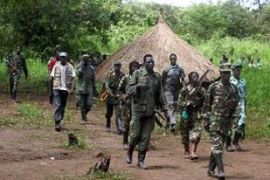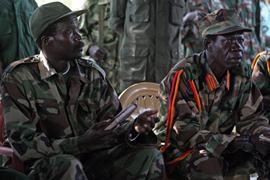LRA and Uganda sign peace pact
Deal provides for disarmament and demobilisation of Lord’s Resistance Army

| Analysis |
The final peace agreement could end one of Africa’s longest-running conflicts.
The rebels refuse to set a date unless Joseph Kony, their leader thought to be hiding in the Democratic Republic of Congo’s forests, is granted immunity from the International Criminal Court (ICC).
The court has indictments out on Kony and two of his deputies for crimes against humanity. The LRA has been accused of murder, rape, the abduction of children and slicing off body parts.
ICC indictments
David Matsanga-Nyekorach, head of the Ugandan rebels’ delegation, said: “We will not sign anything unless the ICC indictments are dropped.”
But the spokesman of the government delegation, Chris Magezi, said: “This is another major step towards achieving peace in northern Uganda. The agreement means the LRA must disarm, demobilise and re-integrate into the national army.”
The accord on Disarmament, Demobilisation and Reintegration is the last outstanding item before a sweeping peace deal is signed to cap peace talks that started in July 2006.
Uganda agreed on Friday to set up a special division of its high court to carry out criminal investigations after a final deal. It will also ask the UN Security Council to adopt a resolution requesting the ICC to “defer all investigations and prosecutions against leaders of the Lord’s Resistance Army”.
Rebels about-turn
Despite storming out over the tribunal issue, the rebels returned on Saturday to sign an agreement extending the cessation of hostilities between the LRA and the government.
It was the sixth such extension and Machar said it would last until March 28, by which time he hoped it would be possible to sign a final peace deal. The rebels insisted that Kony must be given immunity first, which the government again rejected.
 |
| LRA chief Joseph Kony with one of his commanders Vincent Otti at Rikwamba [EPA] |
Although the rebellion has little direct impact on one of Africa’s fastest growing economies, ending it permanently would be a major coup for president Yoweri Museveni and a relief in the coffee-exporting country of over 30 million people.
It would also remove a destabilising element in a remote corner of the continent where conflicts can easily spill over national borders.
Ten commandments
The LRA once said it wanted to rule Uganda in accordance with the Bible’s 10 Commandments, but it has never articulated a coherent political vision behind its long war.
Tens of thousands of people have been killed in Uganda and 2 million displaced from their homes in a conflict that has affected the DRC and Sudan.
The stop-start peace process to end more than 20 years of conflict has been continuing for well over a year and a half. A “permanent” ceasefire, to come into force 24 hours after a final peace deal, was agreed a week ago.
Under the new deals, disarmament of the LRA will begin after the one-month transitional period.
Machar, who is also south Sudan’s vice-president, asked the delegates to return to the southern capital Juba on March 12 to work on an implementation schedule for the final peace deal.
Kony adamant
Kony has vowed never to sign a final peace agreement unless the ICC indictments are lifted, a position that has cast a pall over the peace process, mediated by Riek Machar, South Sudan vice-president, and seen as the best chance to end the fighting.
Horrified that the elusive Kony will keep his word, northern Uganda MPs on Friday pressed Kampala to ask the ICC to withdraw the warrants immediately for the sake of peace in the troubled region.
Simon Oyet, a northern Uganda MP, said: “We are concerned that Kony will not sign the final peace agreement expected next month (March) if government does not withdraw the case they took to ICC.”
Kony has said he was ready to to be subjected to a traditional Uganda tribunal over charges of raping and mutilating civilians, enlisting child soldiers and massacring thousands.
